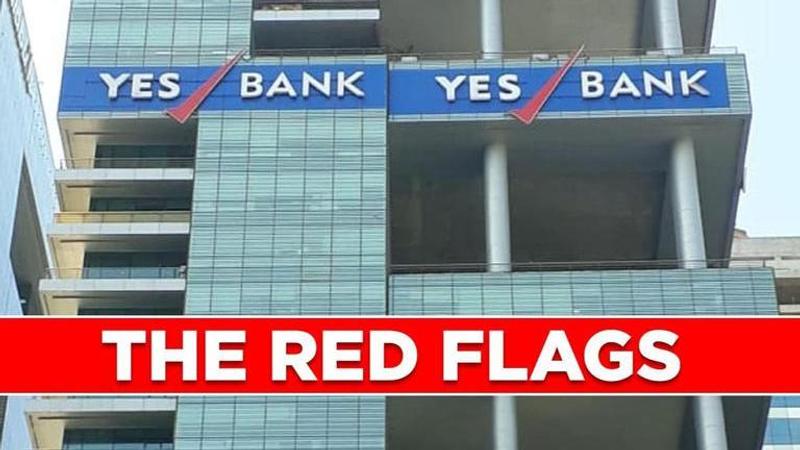Published 18:24 IST, March 6th 2020
Yes Bank Crisis: The red flags that indicated the crisis was coming
So what were the red flags along the way that indicated this serious deterioration in the financial position of Yes Bank? Here is a brief look at the red flags.

On Thursday, the Reserve Bank of India (RBI) placed Yes Bank under moratorium. In a late-night notification, the RBI said, “In the absence of a credible revival plan, and in public interest and the interest of the bank’s depositors, it had no alternative but to apply to the Central Government for imposing a moratorium.” The depositors of Yes Bank are looking at a withdrawal cap of Rs.50,000.
The Red flags in Retrospect:
The RBI has clearly stated, “The financial position of Yes Bank Ltd. (the bank) has undergone a steady decline”. So what were the red flags along the way that indicated this serious deterioration in the financial position of Yes Bank? Were there any red flags at all? Here is a brief look:
The Governance Linked Downgrades
On 27 November 2018, Moody’s downgraded Yes Bank ratings citing corporate governance concerns and the leadership change. This was followed by subsequent downgrades. In fact, in December 2019, the bank’s credit ratings were downgraded once again by Moody’s due to stressed assets and related issues.
The ICRA Downgrade
On 28 November 2018, the Investment Information Credit Rating Agency Ltd. (ICRA) downgraded the long-term ratings for Yes Bank considering the series of resignations from the board of directors.
The SEBI Probe Reports
On 1 April 2019, reports were rife about how the Securities and Exchange Board of India (SEBI) would probe Yes Bank over potential violations of disclosure norms.
The First-Ever Quarterly Loss
It was on 26 April 2019 that Yes Bank posted its first-ever quarterly loss at Rs. 1,506.64 crores. The loss was attributed to the rising levels of bad loans. The very next day, Macquarie Research double-downgraded Yes Bank stock to ‘underperform’.
The Increased RBI supervision
The increased RBI supervision and monitoring of Yes Bank can be traced to 14 May 2019. It was then that former RBI Deputy Governor R. Gandhi was appointed as an additional director on the board of Yes Bank. Such appointments are ordinarily done by the RBI to ensure close supervision of a bank. Back then, Yes Bank called it, “a very positive and constructive measure aimed at further strengthening the Board.”
The Bad Loan Under-Reporting
In November 2019, it emerged that Yes Bank had higher NPAs than it declared. The RBI found that Yes Bank under-reported bad loans by Rs. 3,277 crores as of 31 March 2019. The divergence in gross NPAs with the RBI analysis led to a lower net profit for the Bank.
The Delayed Earning Disclosure
Yes Bank delayed its October-December quarter disclosure in February. In a regulatory filing on 12 February, Yes Bank said, “It will publish its unaudited financial results for the quarter and nine-month period ending December 31, 2019, on or before March 14, 2020.”
The Failed Capital Infusion
Yes Bank had engaged with a few private equity firms to infuse capital. The Bank had even made stock exchange filings to that effect on 12 February. But as per the RBI, “These investors did hold discussions with senior officials of the Reserve Bank but for various reasons eventually did not infuse any capital.”
The Whistleblower's Claims
In January, a Former Director at Yes Bank Uttam Prakash Agarwal resigned citing “serious concerns regarding deteriorating standards of corporate governance, failure of compliance, management practices and the manner in which the state of affairs of the bank are being conducted by CEO and MD Ravneet Gill.” He reportedly wrote both to the SEBI & RBI in the last two months seeking a probe into illegal gains made by some and demanding the removal of Yes Bank CEO and MD for causing erosion in the market capitalisation.
The Pattern of Lending to Defaulters
A close look at the lending pattern of Yes Bank shows, the situation has been worrisome for a while now. In October 2019, Yes Bank had claimed it had an exposure of Rs 2,600 crore to the IL&FS group. It was a key lender to the Anil Ambani Group. Defaulters like Dewan Housing Finance Corp. Ltd (DHFL), Indiabulls Group, CG Power, Cafe Coffee Day and Essel group, all reportedly turned to Yes Bank for their borrowing.
Should Yes Bank depositors be worried?
Finance Minister Nirmala Sitharaman on Friday said, “I want to assure every depositor that their money is safe." Reserve Bank of India (RBI) governor Shaktikanta Das has assured that “RBI will take a very swift decision to revive Yes Bank.”
In fact, SBI Chairman Rajnish Kumar has confirmed in-principle intervention by the bank. He said, “We have given the information of in-principle approval of SBI investment to the stock exchange yesterday night. I will tell you when the time arises. RBI said that they will come out with a restructuring plan.”
But what lies ahead for this bank with pan-India presence across all 28 states and 9 Union Territories, and it's depositors across the nation, remains to be seen.
Updated 22:34 IST, March 6th 2020




